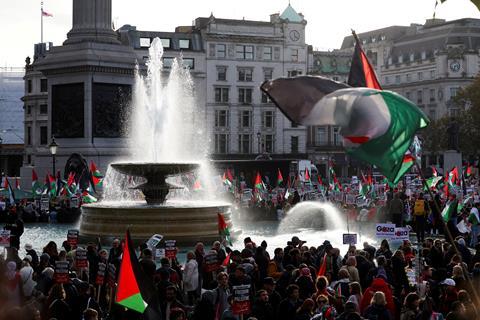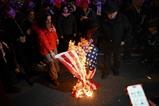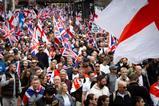With pro-Palestinian demonstrations planned in the capital this Armistice Day, George Pitcher says it’s easy to call for peace when the conflict is thousands of miles away - much harder when your family is under constant threat from terrorists. Nevertheless, he says, peaceful protests should be welcomed, but antisemitism cannot

It’s depressingly predictable that this year’s Armistice Day, on Saturday, is polarising public opinion. With the backdrop of the war in Gaza, a planned pro-Palestinian demonstration was called a “hate march” by our increasingly bellicose home secretary, Suella Braverman, while Met Police commissioner Sir Mark Rowley has, so far, stood his ground on the rule of law and the right to protest in our democracy.
Meanwhile, London’s Jews feel beyond intimidated by the capital’s belligerent response to the bombing of Gaza by Israel, some 3,000 miles away. It’s worth remembering (and I use that word carefully) that among the war dead being commemorated this weekend will be those who blanket-bombed German civilians in cities such as Dresden. That was very much to defend our borders, the chosen phrase of prime minister Rishi Sunak in his support for Israel.
If Christians, Jews, Muslims and those of other religions and none, march peacefully for peace on Saturday, then they are children of God
Britain’s indiscriminate bombing policy in world war one was (somewhat courageously) opposed in the House of Lords at the time by George Bell, Bishop of Chichester. But his was a lone voice in defence of innocent civilians. How times have changed.
Bell might have garnered wider support for his point if he made his speech today, but I rather doubt it. It’s easy to have strident views on a war thousands of miles away, but defeating an enemy who wants to kill one’s own family rather concentrates the mind.
A just war
Nevertheless, the bishop sought to articulate the Christian view that, in a just war, we should seek in every way we can to protect the lives of non-belligerents. I wonder how that Christian view, in an at least nominally Christian country such as the UK, could be applied today.
We don’t hear much of it. We witnessed it in how our late Queen religiously (in every sense of the word) insisted on marking Remembrance Sunday with dignity and solemnity. The head of state - and the established Church - honours those who died to save the world from tyranny, and a re-commits to the peace they bequeathed us all.
Today, Sunak tries to channel some of this by citing those who wish to remember the war dead “in peace and dignity”. But he does so in the context of condemning the pro-Palestinian protest in London on Armistice Day as “provocative and disrespectful”. It’s hard to avoid the unworthy thought that perhaps he only approves of peace marches with which he agrees.
Remembering
Before coming to what is “provocative and disrespectful” about his government’s policies, it might just be worth unpacking the Christian idea of remembrance a little. It is at the heart of religious observance in our communion. We repeat the words of the Christ, at his last supper with his friends, as we break bread as his body and share wine as his blood: “Do this in remembrance of me” (Luke 22:19).
On Remembrance Sunday, we come together as the body of the Prince of Peace in the world
This is not an act of simple recollection. To understand what it really means, it’s helpful to hyphenate the word: “Do this in re-membrance of me.” We come together in our communion (or Eucharist, which has as its root the Greek word for thanksgiving) as members of the body of Christ, putting that body together again in the world. We remember him by re-membering him.
We might argue that we do the same on Remembrance Sunday. We come together as the body of the Prince of Peace in the world. And we might argue that anyone who comes together with a multitude for peace, be they Muslim, Jew or unbeliever, does the same thing. They might even do that on a march.
Making peace
Last week, we celebrated the feast of All Saints, at which the Beatitudes are traditionally read, the Gospel’s summation of the Christian ethos. We heard: “Blessed are the peacemakers, for they shall be called the children of God” (Matthew 5:9).
If Christians, Jews, Muslims and those of other religions and none, march peacefully for peace on Saturday, then they are children of God. Before anyone accuses me of being other-worldly, they also march, in the Christian view and therefore in the eyes of the state, in resistance to and defiance of those who chant anti-Semitic slogans and promote violence.
They may be at the same march but they’re not of the same march. What we’re separating here, as the police might, are the peacemakers from the “provocative and disrespectful”, the sheep from the goats, the wheat from the chaff.
In those same Beatitudes, we also hear: “Blessed are poor, for theirs is the kingdom of heaven” (Matthew 5:3). Our current home secretary proposes to solve homelessness by deny street-sleepers the charity of tents, claiming theirs is “a lifestyle choice”. This Remembrance Sunday, we may wish to make a lifestyle choice by asking just who is being “provocative and disrespectful” here.






































No comments yet